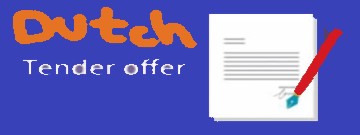
A Dutch Tender is a unique type of tender offer where a company offers to repurchase its own stock within a given price range. The total amount to be spent on the stock is usually fixed in advance, leaving the number of shares to be purchased as the variable. Shareholders can tender their shares over the following offer period by specifying the lowest price within the range that they will accept. Subsequently, the company purchases the maximum number of shares tendered up to the fixed amount. Shareholders who tendered at a higher price run the risk of not getting filled should the offer be over subscribed.
This transaction process is often referred to as a “modified” Dutch Auction. In this sense, investors are bidding at a price to have their shares bought from them. The two terms are frequently confused and used interchangeably, often incorrectly. A Dutch Auction is selling a product, share or bond, whereas a Dutch Tender is where the issuing company is buying back the item in question. Usually the asset in question being bought back by the firm is it’s own stock. By making this Share Repurchase and buying back its own shares, the firm can support the value of its own stock price and return excess cash to shareholders as required. This tactic may be used as a shark repellent to fend off a hostile takeover from an unwanted acquirer. The real life examples for Monster Energy and Yahoo below demonstrate how this process works.
Dutch Tender Example
On May 16, 2016 Monster Energy (MNST) announced
that it has commenced a modified “Dutch auction” tender offer to purchase shares of its common stock for cash at a price per share of not less than $142.00 and not greater than $160.00, for a maximum aggregate purchase price of no more than $2.0 billion. The tender offer, which will be funded with cash on hand, begins today, May 10, 2016, and will expire at 5:00 p.m., New York City time, on June 8, 2016, unless extended or earlier terminated by Monster.
The press release went on to explain some finer points of the offer
All shares accepted in the tender offer will be purchased at the same price, which may be higher or lower than the market price immediately prior to or during the tender offer. If the tender offer is fully subscribed, then shares of common stock having an aggregate purchase price of $2.0 billion will be purchased, representing between 6.2% to 6.9% of Monster’s issued and outstanding shares as of April 15, 2016, depending on the purchase price payable in the tender offer.
On June 14, 2016, Monster announced the results of the offer
Based on the final count by American Stock Transfer & Trust Company, LLC, the depositary for the tender offer, Monster accepted for payment an aggregate of 12,820,512 shares, representing approximately 6.3% of the shares issued and outstanding prior to the completion of the purchase, at a purchase price of $156.00 per share. Because the number of shares tendered at or below the $156.00 purchase price would have exceeded the aggregate purchase price of the tender offer, shares were accepted for purchase on a pro rata basis, and the resulting proration factor, after giving effect to the priority for “odd lots,” was approximately 98.7%. The depositary will promptly pay for all the shares accepted for payment and will return all other shares tendered.
This provided Monster with a cost effective way of buying back its stock at a price that was set by the market.
A Further Example - Yahoo
The following text is taken from the Business Wire Yahoo (YHOO) Press Release on May 16, 2017 entitled “Yahoo Announces Commencement of Tender Offer to Purchase up to $3.0 Billion of Its Common Stock“.
SUNNYVALE, Calif.–(BUSINESS WIRE)–Yahoo! Inc. (“Yahoo” or the “Company”) (NASDAQ: YHOO) announced today the commencement of a modified “Dutch auction” self-tender offer to purchase for cash up to $3,000,000,000 of shares of its common stock at prices equal to (A) the “Alibaba VWAP” (as described below), multiplied by (B) multiples specified by tendering stockholders not greater than 0.420 nor less than 0.370, provided that in no event will the purchase price be less than $37.00 per share, less applicable withholding taxes and without interest. The terms and conditions of the tender offer are set forth in an Offer to Purchase, Letter of Transmittal and related documentation that are being distributed to holders of the Company’s shares and are being filed with the U.S. Securities and Exchange Commission (the “SEC”).
In both examples, references are made to a “modified” Dutch Auction which appears misleading. However, the actions required of the stockholder are clear. The offer subsequently remained open for one month.
